May 30, 2006
'Do we really have more substance than the ghosts we endlessly applaud?'
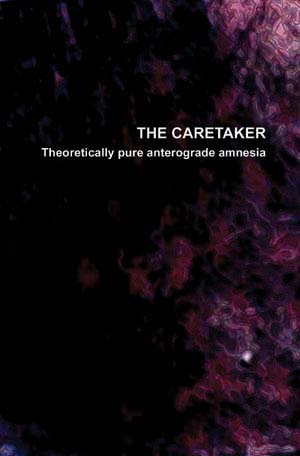
My copy of the Caretaker box set arrived a few days ago. A marvellous thing (worth 16 quid of anyone's money), produced according to exemplary cyberpunk principles: high quality, no middle-men, (and therefore) fast. I only finished the sleeve notes a couple of weeks ago, and here they are already, presented in a lovingly prepared glossy booklet.
A line from the Caretaker piece - 'Do we really have more substance than the ghosts we endlessly applaud?' - came to mind when I saw this stupefying non-news on Blissblog:
'From the current issue of The Wire's 'Bitstream' news section:
London's Institute of Contemporary Arts (ICA) has awarded 10 thousand pounds to artist Jo Mitchell to stage a reenactment of a notorious 1984 ICA performance involving members of Einsturzende Neubauten and Fad Gadget's Frank Tovey, among others. Called Concerto for Voice and Machine, the event was legendarily chaotic, with members of the group attacking the wooden stage with pneumatic drills, purportedly in order to reach secret tunnels rumoured to run between government departments and Buckingham Palace underneath the Mall, and the audience joining in by tossing glasses into a cement mixer. It ended when ICA staff turned the power off. The reenactment is scheduled to take place in February 2007.'
I share Simon's bemusement. 'Does that mean ticket holders are allowed, or expected, to riot, smash up the stage, etc? Or will the mayhem all be enacted by performers, garbed in painstakingly authentic circa-1984/Immaculate Consumptive-type clothes and hair, like one of those fake Medieval villages you can visit with blacksmiths hammering at the anvil, milkmaids tugging teats and lugging pails, miscreants in the stocks, and so forth?'
The planned reconstruction is not so much a Non-Event (a historical occurrence on a grand scale, but which functions to reconfirm the existing order, or which effectuates a Restoration, e.g. Live Aid and the Gulf War) as an Anti-Event (something which covers over an actual Event and replaces it with an officially-sanctioned commemoration).
'Things catch your attention for a while but you do not remember them for very long. But the old memories persist, intact.... Constantly commemorated...
The past cannot be forgotten, the present cannot be remembered.' (from the Theoretically Pure Anterograde Amnesia sleevenotes)
May 27, 2006
"The big Other at its purest is legal order"...
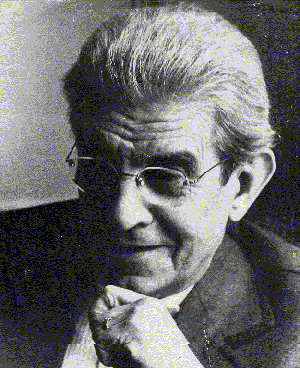 | 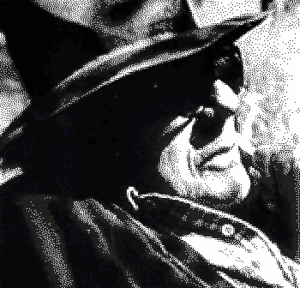 |
Typically brilliant report on the Thursday Zizek lecture from Daniel at Different Maps.
Like me, Daniel notes an increasing convergence between Zizek and Deleuze. 'Zizek seems to be moving closer and closer to Deleuze with every day that passes, on the basis of the surely double-edged (for Zizek) syllogism Deleuze = Hegel + Lacan.' As if to prove one of the points Zizek kept making, though, the Deleuze, Hegel and Lacan that return via Zizek are not the same figures they were before; through repetition, difference emerges.
One of the question posed on Thursday, was: why does Deleuze turn away from Lacan and Freud? The quick, somewhat journalistic-biographical answer would be that Deleuze (with Guattari) fell under the spell of a 68 spontaneism, one effect of which was a lose patience with questions to do with metalanguage. If the problem with deconstruction is that it effectively says there is nothing but a metalanguage, the vice of Deleuzianism is its skating over the whole question; forget metalanguage, we are told, we can have direct machinic encounters. What Deleuzianism overlooks - what is has to overlook - is that it is precisely the invocation of an intense, unmediated non-cognitive and non-linguistic experience that introduces an element of transcendence and lack. That is because the philosophical call for an unmediated Real must always repress the Real of the writing and thinking involved in that call itself. (By the by, many of the Deleuzians I've known are exactly the sort of people least able to give themselves over to immediate, noncognized experience - they are those who will be jabbering about philosophy when they are on a drug trip, or taking notes when they are in a nightclub - real examples both). But why deny that writing, thinking and speaking can themselves be sources of jouissance, unless you are in hock to a certain kind of Romanticism? What is lacked in the Lacanian death drive is only the fullness of the desired object or the possibility of the termination of the drive - and who, especially a Deleuzian, would want either of those things?
It seems that Deleuze has a real difficulty thinking what Lacan calls 'the spaltung' (the split). Deleuze can only conceive of the split between the subject of enunciation (that which speaks) and the subject of the statement (that which is spoken about) in dualistic terms. Hence his calling Lacan a Cartesian, an accusation which Zizek has famously turned around. Instead of seeing Lacan as the last Cartesian, Zizek advances the thesis - in Tarrying with the Negative and elsewhere - that Descartes is the first Lacanian.
Deleuze proclaims that the 'only enemy is two'. He understoods perfectly well that a split is involved but is unable to grant any ontological specificity to the concept of the split, and rushes to reduce it to a dualism: 'the source of dualism, it seems to me... is this flattening of all statements of thought, precisely, by this speculative, Oedipal apparatus in which the statement, on the one hand, is related to the subject, to a subject, and on the other hand, and simultaneously, the subject is split into a subject of the statement and the subject of enunciation.' (By contrast with Deleuze, the Irigarayan concept of the 'not one' - with its Imaginary figuration as the lips which are neither one nor two - does grant ontological consistency to the split.) Perhaps we can oppose the Lacanian spaltung to the Deleuzian 'between'; whereas the between takes its place in the interstitial gap between unities, the spaltung breaks unities into less than one (there is no possibility of unification) and more than one (the subject is always doubled, which is not to say dual).
"The big Other at its purest is legal order," Daniel quotes Zizek as saying. There, in nutshell, is the reason for my loathing of lawyers and the postmodern lawyer plague. Law and PR are the twin avatars of the big Other in postmodernity, with the agents of capitalist parliamentarianism (politicians) poised between the two. What both the lawyer and the PR person herald is a new post-veridical mode that is not lying but in which the question of truth and falsity is suspended in favour of illocutionary efficacy. For example: it doesn't matter that every single human subject knows that Bill Clinton 'had sex with that woman' provided the juridical big Other does not hear it said that he did. (In both law and parliamentary politics, a theatrical adversarialism covers over class solidarity. We all know that the Real of the house of commons or a courtroom is to be found in the bar after a debate or a trial, where the staged dispute gives way to conviviality.)
The latest emergence of the obscene underside of this 'politics of nontruth' occurred last week when it was revealed that the Labour Party had auctioned a copy of the Hutton report signed by Cherie Blair. It is the speed of the switch from po-faced piety to officially-sanctioned cynicism that is astonishing here. Already, a lived historical sequence, a sequence that is still in-becoming, has become dead History; the Hutton report is a museum piece, the occasion for an anecdote on an I Heart 2005 retrospective. Remember when we hounded a man to his death, eh? What was in the charts at the time?
Daniel's piece has reminded me of two other questions I would have posed to Zizek on Thursday if I had had the opporunity.
1. Is it a matter of eliminating the big Other altogether or of producing a new big Other? The Tom Ripley of the later novels, with his beautifully-kept house and impeccable taste strikes me as being the avatar of the Glam impulse - his living of the perfect upper middle class life, his living it better than his Betters, ends in the same impasse of empty success that has existentially blighted Bryan Ferry for the last thirty years, and it is clear that Ferry's case was something that punk had to nihilate. If for Ferry, as for Ripley, only the big other exists, what Rotten proclaimed was that there is no big Other, you do not need validation from pre-existing Opinion. But, is it possible to imagine a big Other that is not inherently productive of mediocrity, conservativism and conformity? I think this is the real significance of Nietzsche's call for 'aristocratic values' and his rejection of the 'herd ideal'. Nietzsche wanted a big Other that would challenge us, make demands of us, make us want to be more than what we are. But the current V and A show demonstrates that the call for excellence and novelty need not, as Nietzsche thought, be essentially elitist - Modernism was about libidinizing a Public Good that, according to neo-liberalism, can only be drab, dreary and mediocre. Daniel puts it like this: how do we make ourselves a big Other without organs?
2. (And this is perhaps the same question as 1 but posed slightly differently.) Is there a difference between the big Other and the ego-ideal? It seems to me that iwhat drives us to struggle to be more than we are must be something like the ego-ideal, the virtual audience - our spectral double - whom we seek to be worthy of.
May 26, 2006
Why are you so afraid of class?
 |  |  |
Zizek's lecture at Birkbeck yesterday, the first in a series of Lateral Introductions to Lacan, was devoted to the big Other.
He began with another, timely swipe at Bobonoism. (He noted, by the way, that in every single country in which the Liberal Communist essay was published, a final paragraph, in which he quoted Brecht's idea that, once someone has proven themselves to be a Good Man, we will take them outside and shoot them with a Good Gun, was always removed. One editor even suggested that Zizek might have been misinterpreted as advocating violence....The very thought of it!) He argued that the familiar, facile gesture of guilt-mongering pseudo self-abnegation - every time I type a sentence, ten children are dying in Africa - is the very form of ruling ideology. What it amounts to, he contended, is a form of anti-intellectualism: don't think, just do it. One might add that, even considered in brutely pragmatic terms, twenty years of not thinking, just doing has had little effect on the situation in Africa or elsewhere.
There was actually an interesting convergence between much of what Zizek said and Steve Shaviro's current preoccupations. Zizek used the language of virtuality to describe the big Other, and said that the best formulation of the death drive was provided by Deleuze in Difference and Repetition. Zizek's description of capitalism - that it is, in the Heidegerrian sense, 'worldless', i.e. an 'abstract matrix' that will reconstitute itself in any possible world - was also highly reminiscent of Deleuze-Guattari's account in Anti-Oedipus.
Zizek's examples of the big Other in politics, yesterday as so often before, typically come from Stalinism. It seems to me, though, that the critique of bureaucratic unreason should be targeting the Stalinism that is integral to the current mode of capitalism. The standard line on Stalinism has been to think of it as State Capitalism, and to regard market Stalinism as some deviation from the 'true spirit' of capitalism. But perhaps it would be better to regard Stalinism as being inhibited by its association with a social project like socialism; perhaps, that is to say, the essential form of Stalinism can only emerge in capitalism. Compare, for instance, Old Labour with New Labour; there may have been elements of Stalinist ideology in Old Labour, but in terms of formal organization, it is clear that target-orientated, business-friendly New Labour is far more Stalinist than the Old Labour party ever was. The reason that capitalist bureaucracy often escapes notice, never mind rebuke, is that the critique of bureaucracy has concentrated on its centralizing tendencies. But, as Kafka well understood, distributed, rhizomaniac bureaucracy is far more pernicious and tenacious than its punctual, disciplinary variant. All of this has been very concretely brought out for me by a number of recent experiences:
1. The OFSTED inspection. (I should point out, for readers who are unaware of the ins-and-outs of the British education system, that OFSTED stands for the 'Office for Standards in Education'; it goes without saying that, despite its impressively neutral-sounding name, OFSTED's function is to enforce compliance with the Blair's government's Control agenda.) Under the old system, a college would have a 'heavy' inspection once every four years or so, i.e. one involving many lesson observations and a large number of inspectors present in the college. Under the new, 'improved' system, if a college can demonstrate that its internal assessment systems are effective, it will only have to undergo a 'light' inspection. But the downside of this 'light' inspection is obvious - surveillance and monitoring are outsourced from OFSTED to the college and ultimately to lecturers themselves, and become a permanent feature of the college structure. The diference between the old/heavy and new/light inspection system corresponds precisely to Kafka's distinction between ostensible acquital and indefinite postponement. With ostensible acquittal, you petition the lower court judges until they grant you a non-binding reprieve. You are then free from the court, until the time when your case is re-opened. Indefinite postponement, meanwhile, keeps your case at the lowest level of the court, but at the cost of permanent exertion and anxiety.
In any case, it is not as if the 'light' inspection is better for staff than the heavy one. The inspectors are in the college for the same amount of time as they were under the old system. The fact that there are fewer of them does nothing to alleviate the stress of the inspection, which has far more to do with the extra bureaucratic window-dressing one has to do in anticipation of a possible observation than it has to do with any actual observation itself. The inspection, that is to say, corresponds precisely to Foucault's account of the virtual nature of surveillance. The effect of not knowing whether you will be observed or not produces an introjection of the surveillance apparatus. You constantly act as if you are always about to be observed.
There are other bizarre effects. Since OFSTED is now observing the college's self-assessment systems, there is an implicit incentive for the college to grade itself and its teaching lower than it actually deserves. The result is a kind of postmodern capitalist version of Maoist confessionalism, in which managers and lecturers are required to engage in constant symbolic self-denigration. At one point last year, when our line manager was extolling the virtues of the new, light inspection system, he told us that the problem with our departmental log-books was that they were not sufficiently self-critical. But don't worry, he urged, any self-criticisms we make are purely symbolic, and will never be acted upon; as if performing self-flagellation as part of a purely formal exercise in cynical bureaucratic compliance were any less demoralising.
2. A couple of days ago, when I was placing union's post-Inspection union bulletin in staff drawers, a manager came up to me and hissed, 'issuing another leaflet saying that managers should be sacked, are you?' I pointed out that the last bulletin had stated nothing of the sort; it had simply stated that 'too great a proportion of the college's resources are devoted to management salaries'. He responded by huffing and puffing that he was a union member too, was I suggesting that the union does not represent managers? I paused before replying that it was the other way around: the issue is whether as a manager he feels that he can represent collective interests as opposed to his own class interests. If he cannot, then he might want to consider his position in the union. Faced with this, he repeated 'class interests....' and shook his head. What did this gesture mean? That there are no class interests? Difficult to argue that when senior managers received a 15% pay rise last year and we are being made redundant this year. Or perhaps he was suggesting that he couldn't possibly have any class interests? More likely, his dismissal meant that one does not talk about class any more. As Zizek pointed out yesterday, this move - 'one does not do X' - is crucial to the operations of the big Other. (As Zizek said, it is perfectly possible to imagine a situation in which the majority of people do something, but one still does not.)
3. On Tuesday, I participated in a Natfhe lobby in the cybergothic fortress of the Houses of Parliament. Union members and college Principals were making a case against the FE cuts. No doubt because they had their own agenda ('managers should be left to manage'), the Principals were most vociferous in their assaults on what one of them characterised as the self-sustaining, self-generating bureaucracy which is voraciously but surreptitiously consuming the funds for Further Education. The Learning and Skills Council, the unelected, unaccountable quango at the heart of the FE funding labyrinth, came in for particular attack. An MP then remarked that, yes, the Learning and Skills Council is a difficult body to deal with... Who does control it, then, if it is not answerable to members of parliament? Here was a classic example of one of the central mysteries of the big Other: namely, how does the order itself emerge? On the face of it, it is not clear how particular directives have generated themselves, since they are not there in government policy itself. The answer is that the LSC 'interprets' the instructions issued by the Department for Education and Skills. These interpretations then become indirect discourse, i.e. they are what the big Other thinks. It is of course in the nature of bureaucracy that no-one involved in it can say, 'I commanded this'; the decision is always-already made by some other party. The Castle proliferates laterally as well as upwards...
We're invited to believe that the worst effects of Stalinism arose from its 'dogmatic' intransigence; but it is precisely because so much was left open to interpretation that its Terror was so pervasive. As Zizek reiterated yesterday, even the Nomenkultura themselves - including Stalin and Molotov - had to interpret a complex series of social semiotic signals. Contrary to neoliberal ideology, which pretends that outsourcing leads to greater efficiency and reduced bureaucracy, every time a relatively centralized bureaucratic body is broken up, the effect is always to increase both Control and confusion (and isn't one of Kafka's great lessons that the two are inseperable?) This is not, needless to say, an argument for a return to the 'good old days' of centralized bureaucracy; the real alternative to rhizomatic bureaucracy is workers gaining control of their own working conditions and practices.
 |  |
Turning away from politics for a moment, Zizek conjectured yesterday that only the unsent letter arrives at its destination. Citing an example from a Ted Hughes biography, he asked, why does one keep an unsent letter? The answer is obvious: because the big Other can see it. This immediately put me in mind of the opposite case, as exemplified by David Kelsey in This Sweet Sickness. Kelsey's love affair with Annabelle is conducted almost entirely through letters, but these letters, though sent, are not really intended to be read, at least not by their ostensible addressee. What makes Kelsey a psychopath is not that he is unaware of the other, but that for him only the big Other exists. The same is true of Tom Ripley; Ripley cares little about the fact that particular individuals have inklings about his murderous past, so long as 'general opinion' (i.e. the big Other) is kept ignorant. When I asked Zizek about this, he repeated his argument that Anthony Minghella's film had distorted the Ripley character by humanising and sexualising him. When I observed that Minghella had shifted the dynamic from class to sexuality, Zizek agreed, but found the Chair hurrying him to move on to the next question.
'Why are you so afraid of class?' Zizek demanded. 'The big Other noticed your haste...'
May 24, 2006
CONSENSUAL HALLUCINATIONS
My abstract for the Cultural Fictions event at Goldsmiths:
 |  |
Stephen King's The Shining (1977) and William Gibson's Neuromancer (1984) both centrally concern what Gibson calls 'consensual hallucinations'. The major Events of The Shining and Neuromancer take place in an abstract zone that exists only in the 'nonspace of the mind' (Gibson). But this 'mental nonspace' is in no way a logically private interiority. On the contrary, King and Gibson's novels demonstrate that capital colonizes all levels of the psyche at precisely the same moment that it destroys any concept of public space. Cyberspatial sociality depends upon a kind of Oedipalized telepathos; in the Matrix, the same signal is beamed out to all OedIPods.
Cyberspace would be nothing if we didn't believe in it, but what would we be, now, outside cyberspace/ capital?
Capital - the 'decoding of all previous social formations' (Deleuze-Guattari) - reveals that there is no social without the fictional, but, as the fictional consistencies which formerly glued together the social dissolve into neuromantic capital's 'fictional quantities', it becomes possible to see that capitalism is essentially hyperstitional. Its spectral hype-dynamics use (un)belief as the motor of an auto-exciting feedback circuit that ceaselessly reprocesses (what counts as) reality.
Time is out of joint. Archaisms return at the terminal point of History. Spectres stalk the Matrix: the leisured ghosts partying in The Shining's Overlook anticipate a permanent restoration of ruling class power. In Neuromancer, the withered claw of the incestuous Gothic Tessier-Ashpool clan still holds the key to cyberspace.
But there are other spectres too.... Out beyond the Matrix OedIPod, another kind of consensual hallucination lurks, a ghost of a chance, the return of something which never happened: Telecommunism...
Currently listening to...
1. The new Scott Walker, which is as good as everyone worth listening to says it is.
2. Brilliant dubstep mix by Paul Autonomic, which establishes that he was absolutely right to correct me for my peremptory dismissal of the genre in my first piece on Burial. I find this gripping and tense in a way that I used to find dubstep empty and uninvolving.
3. Forthcoming EP by Blackdown. Deeply hauntological, and sharing some similarities with Burial (who brilliantly remixes one of the tracks, 'Crackle Blues'). Like the Burial LP, the EP makes highly evocative use of plaintive, wounded vocal; also like Burial, Blackdown's deploying of muffle, reverb and crackle gives his tracks a somewhat underwater quality. 'Lata', its vocals lifted from Indian classical music, is oneiric, achingly gorgeous, the stolen melody floating through a drowned world of languorous tabla. 'The Danger Line' sounds similarly waterlogged; its vocal samples, taken from a black American prisoner in the 1960s, have an eerie, spectral authority which is somehow reinforced by their being dubbed to the edge of decipherability. 'Crackle Blues' submerges a sepia-tinted Delta blues vocal sample under a drizzle of Burial-like surface noise to conjure a phantasmatic Deep South of 'rain-drenched swamps, spectre-haunted mirrors and scratchy 45s'. It sounds like a record Mickey Rourke would play in Angel Heart...
May 23, 2006
May 20, 2006
...'if you can watch the overlap of one reality with another'
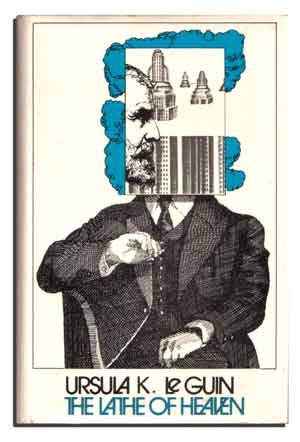
The moment that most fascinated me in Ursula Le Guin's The Lathe of Heaven was its descriptions of times of transition from one reality to another.
The novel concerns George Orr, a man whose dreams literally come true. In time-honoured fairy tale fashion, however, that 'literally' quickly becomes a problem. When, for instance, Orr is induced by his therapist, Dr Haber, into dreaming that the problem of overpopulation is solved, he wakes to find himself in a world in which billions have been wiped out by a Plague; a Plague that, as Jameson pointedly puts it, was 'a hitherto non-existent event which rapidly finds its place in our chronological memory of the recent past, like Proust's furniture racing to reach their correct stations in bedroom space before he is completely awake'.
Much of the power of the novel consists in its rendering of these retrospective confabulations, whose mechanics are at once so familiar - because we perform them every night when we dream - and so odd. How could it ever be possible for us to believe successive or even co-extensive stories that so obviously contradict one another? Yet we know from Kant, Nietzsche and psychoanalysis that waking, as much as dreaming, experience, depends upon just such screening narratives. If the Real is unbearable, any reality we construct must be a tissue of inconsistencies.
What differentiates Kant, Nietzsche and Freud from the tiresome cliche that 'life is but a dream' is precisely the sense that the confabulations we live are consensual. The idea that the world we experience is a solipsistic delusion projected from the interior of our mind consoles rather than disturbs us, since it conforms with our infantile fantasies of omnipotence; but the thought that our so-called interiority owe its existence to a fictionalized consensus will always carry an uncanny charge.

Ursula Le Guin
This extra level of uncanniness is registered in The Lathe of Heaven when Le Guin has Orr's reality-warping dreams witnessed by others - the therapist, Haber, who seeks to manipulate and control Orr's ability, and the lawyer, Heather Lelache. What, then, is it like to live through someone else's dream coming true?
-
'[Haber] could not go on talking. He felt it: the shift, the arrival, the change.
The woman felt it too. She looked frightened. Holding the brass necklace up close to her throat like a talisman, she was staring in dismay, shock, terror, out of the window at the view.
But she had heard him tell Orr what to dream; she had stood beside the dreamer; she was there at the center, like him. And like him, she had turned to look out at the window at the vanishing towers fading like a dream, leave not a wrack behind, the insubstantial miles of suburb dissolving like smoke on the wind, the city of Portland, which had had a population of a million people before the Plague Years but had only about a hundred thousand these days of the Recovery, a mess and jumble like all American cities, but unified by its hills and its misty, seven-bridged river, the old forty-story First National Bank building dominating the downtown skyline, and far beyond, above it all, the serene and pale mountains. ...
She saw it happen. And he realized that he had never once thought that the HEW observer might see it happen. It hadn't been a possibility, he hadn't given it a thought. And this implied that he himself had not believed in the change, in what Orr's dreams did. though he had felt it, seen it, with bewilderment, fear, and exultation, a dozen times now; though he had watched the horse become a mountain (if you can watch the overlap of one reality with another), though he had been testing, and using, the effective power of Orr's dreams for nearly a month now, yet he had not believed in what was happening.
This whole day, from his arrival at work on, he had not given one thought to the fact that, a week ago, he had not been the Director of the Oregon Oneirological Institute, because there had been no Institute. Ever since last Friday, there had been an Institute for the last eighteen months. And he had been its founder and director. And this being the way it was - for him, for everyone on the staff, and his colleagues at the Medical School, and the Government that funded it - he had accepted it totally, just as they did, as the only reality. He had supressed his memory of the fact that, until last Friday, this had not been the way it was.
That had been Orr's most successful dream by far. It had begun in the old office across the river, under that damned mural photograph of Mount Hood, and had ended in this office ... and he had been there, had seen the walls change around him, and had forgotten it. He had forgotten it so completely that he had never even wondered if a stranger, a third person might have the same experience.
What would it do to the woman? Would she understand, would she go mad, what would she do? Would she keep both memories, as he did, the true one and the new one, the old one and the true one?'
Does she 'go crazy'? No, not at all: after a few moments of bewildered fugue, Heather Lelache accepts the 'new' world as the 'true' world, editing out the point of suture. This strategy - of accepting the incommensurable and the senseless without question - has always been the exemplary technique of sanity as such, but it has a special role to play in late capitalism, that 'motley painting of everything that ever was', whose dreaming up and junking of social fictions is nearly as rapid as its production and disposal of commodities. To be able to function in late capitalism without being a psychological wreck, it is necessary to accept the insane as standard.
One of the middle managers at work has turned this into a fine art. He asserts with full confidence a story about the college and its future one day; then literally the next day will happily propound a story that directly contradicts what he previously said. There is no question of his repudiating the previous story; it as if he, like Heather Lelache, he only dimly remembers there ever being another story. This, I suppose, is 'good management'. It is, also, perhaps the only way to stay healthy amidst capitalism's perpetual instability. On the face of it, this manager is a model of beaming mental health, his whole being radiating a hail-fellow-well-met bonhomie. Such cheerfulness can only be maintained if one has a near-total absence of any critical reflexivity and a capacity, as he has, to cynically comply with every directive from bureaucratic authority. The cynicism of the compliance is essential, of course; the preservation of his 60s liberal self-image depends upon his 'not really believing' in the auditing processes he so assiduously enforces. If the reality program has been set up elsewhere, there is nothing he can do, so he must tell himself, but play along with it. This disclaiming of responsibility is now so widespread amongst managers that to invoke the old category of 'bad faith' scarcely seems adequate for what is a structural effect. Which is to say: the managers of capital are well-practised in living someone else's dream. Or someone else's nightmare...
Or someThing else's nightmare....
For what we are living through is not the dream of a subject, but the dream of Capital...

Wendy Brown
Which brings us to 'American Nightmare: Neoconservatism, Neoliberalism, and De-democratization', an outstanding lecture given by Wendy Brown, Professor of Political Science at Berkeley, on Friday night at Westminster university. Her address was in part a response to a suggestion of Stuart Hall's that it was necessary to analyse current forms of power in terms of dreamwork. What the dreamwork does, Brown recognized, like Le Guin before her, is to produce an - always retrospective - narrative consistency which covers over anomalies and contradictions . Brown's analysis had the literally stunning effect of rousing us from the trance in which we blithtely accept that neoliberalism and neoconservatism are in some way logically consistent. Her performance - and it was very definitely a brilliant oratorial performance - perfectly demonstrated that the role of the critical intellectual is to expose the arbitrary and contingent conceptual stitching holding the ruling order together.
Brown showed, first, that neoliberalism - which is amoral and based upon the satisfaction of desire - and neoconservatism - which is explicitly moral and based upon the regularion and sublimation of desire - operate from premises which are not only inconsistent, but directly contradictory. But incoherence at the level of what she called 'political rationality' does nothing to prevent symbiosis at the level of political subjectivity, because the latter is precisely a matter of dreamed confabulation.
The neoliberal subsumption of democracy - and let's be clear, Brown was well aware of the dangers of unproblematically privileging democracy as a concept - is evidenced by the way in which governance no longer makes any appeal to the public good but justifies itself via the business criteria of effectivity. Bush's sidestepping of questions about the 'truth' of his statements about Iraq with the response 'but we got rid of Saddam didn't we?' and his description of his first election 'victory' as 'political capital' (rather than as a mandate) are exemplary of the way in which American governance has been absorbed into what I have called business ontology. One consequence of the displacement of democratic values has been the acceptance that there will be a permanent under- (or criminal) class, a more or less explicit rejection of universalism.
Neo-conservatism, Brown observed, is not a movement so much as an orientation, a ragbag of disparate lobbies united only by what they loathe. The secular Cold Warriors, evangelical Christians, Jewish Straussians and the other myriad interest groups who comprise neo-conservatism all share a horror of intellectuals and artists. If the model for the neo-liberal state is the firm, for the neocons, it is the church. (And despite the anti-state rhetoric, both neocons and neoliberals are committed statists, whose projects would be unthinkable without an authoritarian state.)
Neoliberalism, Brown argued, is no longer a 'contestable agenda' because it 'depoliticizes social problems'; a key example here would be the use of 'boutique medicine' to solve health problems, particularly mental health problems. Neoconservatism, meanwhile, reduces the capacity of the population to participate or challenge by producing a submissive, obedient citizen. Brown's haunting example of this was the 'Support our Troops' car sticker. What is remarkable about the injunction on the sticker, Brown argued, is its contentlessness - for what would it be to not support 'our' troops? What is demanded is an absolute subordination to authority, a subordination which takes its model from religion.
One consequence of this is the performative quality of neoconservatism's authoritarian populist discourse. In the heady, long-forgotten triumphalist days when the bombing of Iraq could still appear successful, neocons used to laugh at 'comical Ali', the Iraqi foreign minsiter who flagrantly denied the undeniable. It hardly need be pointed out that the current neocon pronouncements about the 'success' of the Iraq misadventure now share exactly the same quality of absurd dissimulation, although what is at stake in what Brown called the 'declarative modality of truth' is more than a simple matter of deception. I'm reminded of Deleuze and Guattari's claim that the function of official announcements is not to tell us what is true; it is to tell us what we are now expected to believe.
To see how this 'declarative modality' functions, we can turn back to Le Guin. Witness how Haber's tone of voice and confidence are enough to convince Lelache that what she has just seen happening cannot possibly have occurred.
-
'Are you a native Oregonian?'
After a minute, she nodded groggily. The matter-of-fact tone of his voice was getting through to her.
'Ever been East, Miss Lelache?'
She looked at him vaguely and said, 'No'.
'Well,' why bother. New York's doomed in any case, and Boston and anyhow the future of this country is out here. This is the growing edge. This is where it's at, as they used to say when I was a kid; I wonder, by the way, if you know Dewey Furth, at the HEW office here.'
'Yes,' she said, still punch-drunk, but beginning to respond, to act as if nothing had happened. A spasm of relief went through Haber's body. He wanted to sit down suddenly, to breathe hard. The danger was past. She was rejecting the incredible experience. She was asking herself now, what's wrong with me? Why on earth did I look out the window expecting to see a city of three million? Am I having some sort of crazy spell?'
This would also be a perfect example of the way in which capitalist realism privatizes stress. Not: is capitalism insane? But: am I having a crazy spell? The neurotic achieves normality only by accepting, which is to say living within, the inconsistencies of the symbolic order, whereas the rationalist who cannot accept these inconsistencies as somehow natural is in the position of the psychotic.
Brown restricted her aim to analysing the nightmare rather than suggesting any solution to it. She would not accept that the nostalgic hankering after old conservatism or the strategic defence of liberal democracy - as pathetically advocated by Chantal Mouffe in the audience - were either viable or desirable positions to hold.
The problem is a vast one, but it can be quickly dramatized when we counterpose Jameson's Postmodernism, or the Cultural Logic of Late Capitalism with his latest book on Utopia and Science Fiction, in which the Le Guin essay can be found (Jameson actually compares The Lathe of Heaven with the Strugatsky brothers' Roadside Picnic, the novel on which Tarkovsky's Stalker was based). Postmodernism presupposes the collapse of Utopia. That is why capitalist realism is not a particular type of realism; it is more like realism in itself. For what is the triumphalism of capitalism based on if not the claim that it has dissolved all illusions? (It might have dissolved all previous illusions, but capital is the grandest theology ever to take hold of the planet.)
So the supposed realism of both neoconservatism and neoliberalism should not be taken at face value. Theirs is the realism of the depressive. Depression, as I have argued before, is an ontological thesis, not simply an affective state. Business ontology is not somethings that is easily libidinized; any excitement that the social field has been reduced to this will only ever be somewhat muted. It is impossible to imagine business values being advocated except by contrast with the failed projects over which they proclaim their superiority. Their assertion is a symptom of the disintegration of belief rather than a belief in itself.
The problem is not the defeat of a particular leftist project but the late capitalist-Pomo liquidation of social projects as such - the defeat of modernism in other words. The question of modernism's demise is of course raised afresh by the current V & A Modernism show. As Owen puts it: 'Now, presumably, that the work of PoMo is complete, the defeated adversary can be mounted on the dais, can be assessed, can even become another plunderable style. Or, on the contrary - perhaps the interest in Modernism, the endless Sunday Supplement features, are a melancholy kind of resistance: no age, surely, has been less Utopian than our own (unless one counts some of the more gonzo ideas of the Neo-Conservatives). The last 27 years of being told THERE IS NO ALTERNATIVE has burrowed into everyone’s subconscious.'
Walking through the Modernist show at the V & A on Saturday, I had the same flash that I sometimes get when I'm in the British Museum. As Ccru suggested in its piece 'Flatlines', the British Museum - artifacts torn from their lifeworlds and assembled as if on the deck of some Predator spacecraft - gives you capitalism, the Thing, the unnameable, the parodic universal history 'in the raw'. SF Capital, then, as what Steve Shaviro calls the 'age of aesthetics', where all the great human projects are now presented as exhibits. The power of capitalist realism derives in part from this ironic subsumption and ceaseless re-consumption of all previous history - capitalism is what is left when beliefs have collapsed at the level of ritual or symbolic elaboration, and all that survives is the simulated transcendence of the consumer-spectator, desolately trudging through the museum and looking at how we used to believe, their only remaining beliefs belonging to the disavowed theology of capital (buy a souvenir when you leave).
But there is a disavowed utopianism not so far beneath the surface in the case of both neoconservatism and neoliberalism. Could it be said, in fact, that the disavowal of Utopianism is one of the threads which sutures neoconservatism and neoliberalism together? For the neocons, the Utopia is already achieved (why, who could doubt that the USA is the most free society ever to exist on earth?) but it has been damaged. America the beautiful has been wounded, and must be restored. The talismans of that restoration is the (holy) Family, with women back in the kitchen. Neoliberal utopianism is energetic; a vital nonhuman force - sometimes glossed by neoliberal theologians as 'complexity' - 'wants to be free' but is repressed by the old Stalinist State, which survives now almost solely in the fantasmatic economy of the neoliberals. (They must dread the day when North Korea finally succumbs to Krispy Kreme donuts...)
To return, then, once more, to Le Guin's novel. She conceived of The Lathe of Heaven as her tribute to PKD, and it is indeed like Dick without the bad prose and the wearisome kookiness. But also without the schizophrenic radicality. The novel's 'villain' is the therapist, Dr Haber, who tries to use Orr's dreams to change things. Even though Le Guin is far too canny, too committed to a certain dialogic model of literary craft, to fully demonise Orr, it is hard not to take from the novel a familiar, conservative message, quintessentially anti-modernist: trying to change things only leads to worse catastrophes. It is another version of the old SF warning against Promethean over-reaching and playing God. Haber, though, is less a god than a kind of ameliorative demiurge, an ontological utilitarian, convinced, contra Leibniz, that there is a better possible reality than this one, and that the best possible world is something that can be gradually achieved by a series of improvements. But, as Jameson suggests, that ameliorative tendency raises the possibility that the novel can be read, after all, as something other than an anti-Utopia. 'If ... we make Haber not a Utopian revolutionary, who wants to change everything and to transform the very totality of being, and read him rather as a New Dealer and a liberal or a social democrat, egaer for reform rather than revolution, and intent on changing now this, now that, as he encounters the very ills of society one by one on his path; then from an anti-Utopian work the novel swings around into a rather different tradition of inspiration, and iahklu' [the Alien language term in the novel for 'effective dreaming'] becomes the very code word for revolution itself as the dream of a total process.'
Le Guin plays Nietzsche off against himself: opposing the Nietzsche who, anticipating Freud, delighted in the belligerent libidinal forces that lay beneath our superficially benevolent tendencies, to the Nietzsche who insisted that will to power could not be cheated, only deflected, sublimated, or repressed. Haber's motives are (pyscho)analysed as follows:
-
'The quality of will to power is, precisely, growth. Achievement is its cancellation. To be, the will to power must increase with each fulfillment, making the fulfillment only a step to a further one. The vaster the power gained, the vaster the appetite for more. As there was no visible limit to the power Haber wielded through Orr's dreams, so there was no end to his determination to improve the world.'
Yet this 'no end' is precisely the excess that makes life worth living. If, as Nietzsche says, life is essentially will to power, it is because, as he also says, life is more than life. Nietzsche attacked the stoics in Beyond Good and Evil precisely because their fantasy of 'living according to life' suppressed the way in which life itself was only possible on the basis of a drive that was not containable within the parameters of the vital. Le Guin's taosim - which is at points almost parodically hippy drippy vulgar Deleuzian - repeats the same attempted short circuit. Speaking of the Aliens - who, with their quasi-African names, come to represent a kind of cosmological noble savage, at home in Nature - Orr says:
'They are of the dream time. I don't understand it, I can't say it in words. Everything dreams. The play of form, of being, is the dreaming of substance. Rocks have their dreams, and the earth changes... But when the mind becomes conscious, when the rate of evolution speeds up, then you have to be careful. Careful of the world. You must learn the way. You must learn the skills, the arts, the limits. A conscious mind must be part of the whole, intentionally and carefully - as the rock is part of the whole unconsciously.'
The cheapness of this wisdom - airily dismissed by Haber as 'World soul and so on ... [p]rescienfitic synthesis' - may have something to do with the fact that it has been projected from the fantasies of a white western liberal. As Orr himself notes at one point, 'it's not surprising that the Aliens are on my side. In a sense I invented them. I have no idea in what sense, of course. But they definitely weren't around until I dreamed they were, until I let them be.' Is Le Guin laughing at herself here? Perhaps. We can be sure, though, that Dick - who knew both that the gnosis may be found in cheap dimestore commodities, and that august, sacred texts may turn out to be mass-produced fakes - would have explored that ambiguity more fully.
PKD would also not have surrendered the role of dreaming so quickly to a vision of pacific cosmic harmony. Le Guin's conservatism is ontological as well as political, and that is no accident. Orr's 'achievement', by the end of the novel, is to restore, of the 'ordinary mess' (cf the 'ordinary misery' of the Freudian neurotic) of life, as centred upon domestic coupledom. And there is an aporia at the heart of this concept of 'letting things be', as Jameson observes. 'The contradiction,' he writes, 'inhabits any ethics of becoming what you are already. The problem is that Haber himself, along with his do-gooding personality and complete with his own inner will-to-power is already part of the fabric of being. The will to power is not something outside being, that we could omit in order to exist in some more preaceful state. It is Being itself.'
Le Guin not only opposes Being to praxis, she indulges in an odd but revelatory essentialism, in her treatment of the mixed race character, Heather Lelache. When Haber induces Orr to dream of an end to the race problem, and his unconscious mind comes up with another solution that is absurdly comic in its literalness - a world in which everyone is grey-coloured - Lelache is disappeared.
'That's why she's not here, he thought. She could not have been born grey. Her colour, her colour of brown, was an essential part of her, not an accident. Her anger, timidity, brashness, gentleness, all were elements of her mixed being, dark and clear right through, like Baltic amber. She could not exist in this grey people's world. She had not been born.
He had, though. He could be born into any world, He had no character. He was a lump of clay, a block of uncarved wood.'
This would be an embarrassing relic of a bygone meta-orientalist liberal agenda, a symptom of a benevolent but bewildered cultural relativism, if something akin to that position weren't still current, as was evidenced at the highly charged Xenos (slogan: movement, conflict, dystopia) seminar at Goldsmiths last Wednesday. Houzan Mahmoud faced opposition - as she always does in the UK, she says - from an alliance of believers and academics committed to cultural relativism. The position that she occupies - Iraqi communist woman opposed to both the occupation and political Islam - is politically Impossible in the current conjuncture, therefore it has to be disappeared. There was a predictable degree of disquiet amongst the academics about any leftist assertion of universality. Implicit in their call for 'specificity' and 'context' was not only the empiricist dementia of endlessly finessing representations, but also the meta-orientalist assumption that 'respecting others' means surrendering them to what is taken to be their identity. They can only be what they are, can only exist in their cultural world; 'we' Western academics can, like Orr, 'exist in any world'.

Houzan Mahmoud
Identity politics is not politics at all, since it precisely negates the political as such by re-construing political positions in ethnic terms, subsuming 'ought' under 'is'. The denial of the gap between identity and identification, between, that is to say, the subject of the statement and the subject of enunciation, as crucial for existentialism as it is for Lacanianism, is a presupposition of identity politics. The existentialist sense that there is no human being outside praxis, that there is no 'identity' in some pre-defined sense, is, of course, radically at odds with the rigid designations of the Identity Polis. The message of the Identity Police, after all, is that you should be who you are. Against this, existentialism's claim there is Nothing that you 'are', or that what you are is Nothing, a void, has never been more pertinent. Heather Lelache encounters just such a void when, at the end of The Lathe of Heaven she is assisting her husband to restore Oridnary Reality, and her whole lifeworld disintegrates around her, (and she with it, of course):
-
'The presentiment which had seized Heather, as she looked down from the jade sky was now a presence. It was there. It was an area, or perhaps a time-period, of a sort of emptiness. It was the presence of absence: an unqualifiable entity without qualities, into which all things fell and from which nothing came forth. It was horrible, and it was nothing. It was the wrong way.
Into this, ... George went. He looked back at her as he went, crying out, 'Wait for me, Heather! Don't follow me, don't come!'
But though she tried to obey him, it came to her. It was growing out from the centre rapidly. She found that all things were gone and that she was lost in the panic dark, crying out her husband's name with no voice, desolate, until she sank down in a ball curled about the centre of her own being, and fell forever through the dry abyss.'
Again, it is unclear as to whether Le Guin is making a point by having her mixed race female character's whole existence depend upon her being the hero's brown love interest. What is clear is that Le Guin is too attached to the exisiting reality co-ordinates to conceive of the void as anything but the 'wrong way'. It strikes me, however, that this void - the void which capitalist creative destruction continually gestures towards but continually covers over - is the revolutionary rupture. This, after all, would be the time of the Event, which is also the time of trauma, where ontology is suspended --- and what will henceforth count as reality is up for grabs.
May 19, 2006
Apologies for interruption of service
We have had an OFSTED inspection this week, and while I have not exactly broken my back trying to save the jobs of managers who have just sacked me, it has inevitably been stressful and time-consuming. (I should clarify the situation as regards my own job, by the way: I have been made redundant, but even our management isn't so lunatic as to get rid of me in the middle of a college year. I will have a job until the end of August.) In any case, next week is my last full week of teaching before the students have exams, so I will soon be able to update here more regularly.
The second part of the Fall piece is well underway and should be completed and posted this weekend.
May 13, 2006
Cultural Fictions at Goldsmiths
Folk should book on the Cultural Fictions II event at Goldsmiths.
In addition to the speakers named below (who more than justify the non-entrance fee on their own, I'm sure you'll agree), Steve 'Kode 9' Goodman, Infinite Thought and me should also be giving papers.
'Cultural Fictions II
The Centre for Cultural Studies at Goldsmiths is hosting a conference on the significance of science fiction for disciplines and practices associated with cultural studies, to be held on 15-16th June, 2006. In particular, we will be asking whether sci-fi’s privileged relationship to alterity – e.g. in the forms of the alien, the non-human and above all the future – is what makes it so attractive to politically and philosophically oriented research and other contemporary artistic practices.
Main speakers:
Greg Tate, journalist, cultural critic and filmmaker, regular contributor to Village Voice, founder of the band Burnt Sugar; publications include Flyboy in the Buttermilk: Essays on Contemporary America (Simon and Schuster, 1992) and Everything But the Burden (Broadway, 2003).
Roger Luckhurst, Senior Lecturer, Birkbeck College; publications include “The Angle Between Two Walls”: The Fiction of J G Ballard (Liverpool UP, 1997), The Invention of Telepathy (Oxford UP, 2002), Science Fiction (Polity Press, 2005).
Anthony Joseph, poet, musician, novelist and lecturer; publications include Desafinado (poisonenginepress, 1994), Teragaton (poisonenginepress, 1997) and The African Origins of UFOs (forthcoming, Salt, autumn 2006).
Luciana Parisi, Lecturer in Interactive Media, Goldsmiths College; publications include Abstract Sex: Philosophy, Biology and the Mutations of Desire (Continuum, 2004) and numerous articles on the relations between science, technology and ontological evolution.
Chair:
Kodwo Eshun, lecturer in visual cultures, journalist and cultural theorist, author of More Brilliant than the Sun: Adventures in Sonic Fiction (Quartet Books, 1998), co-founder of the Otolith Group and regular contributor to Wired, I-D, and The Guardian.
There is no charge for this event, but please register your attendance by emailing culturalfictions@gold.ac.uk.
Call for Papers: Postgraduate students with relevant research interests are invited to present short papers (15-20 minutes) alongside our main speakers. Please submit abstracts of 200-300 words to culturalfictions@gold.ac.uk by Friday 26th May. Topics may address any aspect of science fiction but preference will be given to those that emphasize its political and philosophical potential for research in cultural studies, the humanities and the arts. Suggested topics: utopia/dystopia/uchronia, alternative history, human-machine interfaces, philosophies and politics of time, future as ‘other’.
This event is funded by the Arts Humanities Research Council and the Centre for Cultural Studies, Goldsmiths.'
May 11, 2006
Manchester/Modernism/Hauntology
Speaking of modernism and Manchester.... on Tuesday night I had the great privilege to interview one of my heroes, Peter Saville. Peter was every bit as articulate, incisive and fascinating as you'd expect. He was also very generous with his time, and he spent over three hours talking to me about modernism, post-modernism, the end of the sixties and the onset of retrospection culture, the influence of John Foxx (unprompted by me, honest, your honour), commoditization, his new role as Creative Director of Manchester ... A very compressed version of this exchange will appear in Fact magazine.
Speaking of Manchester... I have also written the sleevenotes for the new release by Caretaker, who is based in Manchester. The sleevenotes are exclusive and will not appear here. James is a real enthusiast, someone who produces and packages music out of commitment and enthusiasm. He is putting the album out at his own expense, hoping only to make his money back. The tracks have been available for some time as downloads, but, as ever with Caretaker material, the releases will be art objects in themselves. I've seen previews of the artwork; the album will be a sumptuously presented six CD set. The LP is a phenomenal achievement - it's not so much music as an atmosphere generating kit, classic uneasy listening. Those familiar with the previous Caretaker albums will note a darkening of mood on this one. From the sleevenotes:
'The lights have gone out. The hotel is rotten, a burned out wreck long since gutted, the band is pale and very nearly translucent.
The threat is no longer the deadly sweet seduction of nostalgia. The problem is not, any more, the longing to get to the past, but the inability to get out of it. You find yourself in a grey black drizzle of static, a haze of crackle. Why is it always raining here? Or is that just the sound of the television, tuned to a dead channel?'
Speaking of hauntology... Ghost Box on Resonance tonight. No-one will want to miss this. Here's the GB statement:
'Ghost Box will be hosting a one hour show on London's Resonance FM on 11th May, 19:00-20:00 GMT. You can listen on 104.4FM in London or on-line at resonancefm.com.
We'll be playing old, new and unreleased material from the Ghost Box artists, as well as some material from sessions recorded especially for Ghost Box by James Cargill and Trish Keenan of Broadcast, for a forthcoming project.
We'll also be playing new material from The Focus Group and some tracks from the forthcoming Belbury Poly album, "The Owl's Map" which will be available later this summer. Check our news page for updates.'
May 08, 2006
Memorex for the Krakens: The Fall's Pulp Modernism
PART 1 - part II to follow shortly...
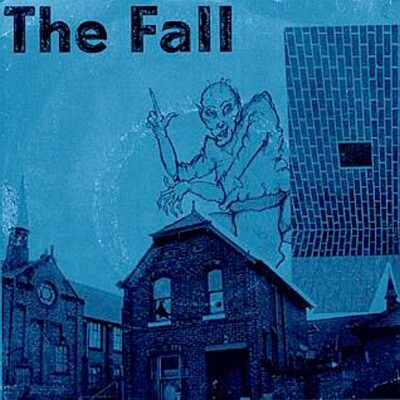
Dragnet sleevenotes: 'maybe industrial ghosts are making Spectres redundant'
Specter Versus Rector: 'MR James be born be born/ Yog Sothoth rape me lord/ Sludge Hai Choi/Van Greenway/Ar Corman'
Mark Sinker: 'Scrawny, gnarled, gaunt: Smith doesn't waltz with ghosts. He materialises them.'
Who can put their finger on the Weird?
It’s taken me more than twenty years to attempt this deciphering. Back then, the Fall did something to me. But what, and how?
Let’s call it an Event, and at the same time note that all Events have a dimension of the uncanny. If something is too alien, it will fail to register; if it is too easily recognized, too easily cognizable, it will never be more than a reiteration of the already known. When The Fall pummeled their way into my nervous system, circa 1983, it was as if a world that was familiar - and which I had thought too familiar, too quotidian to feature in rock - had returned, expressionistically transfigured, permanently altered.
I didn't know than, that, already, in 1983, The Fall's greatest work was behind them. No doubt the later albums have their merits but it is on Grotesque (1980), Slates (1981) and Hex Enduction Hour (1982) where group the reached a pitch of sustained abstract invention that they - and few others - are unlikely to surpass. In its ambition, its linguistic inventivenss and its formal innovation, this triptych bears comparison with the great works of twentieth century high literary modernism (Joyce, Eliot, Lewis). The Fall extend and performatively critique that mode of high modernism by reversing the impersonation of working class accent, dialect and diction that, for example, Eliot performed in The Waste Land. Smith’s strategy involved aggressively retaining accent while using - in the domain of a supposedly popular entertainment form - highly arcane literary practices. In doing so, he laid waste the notion that intelligence, literary sophistication and artistic experimentalism are the exclusive preserve of the privileged and the formally educated. But Smith knew that aping master class morés presented all sorts of other dangers; it should never be a matter of proving (to the masters) that the white crap could be civilized. Perhaps all his writing was, from the start, an attempt to find a way out of that paradox which all working class aspirants face - the impossiblility of working class achievement. Stay where you are, speak the language of your fathers, and you remain nothing; move up, learn to speak in the master language, and you have become a something, but only by erasing your origins - isn't the achievement precisely that erasure? ('You can string a sentence together, how can you possibly be working class, my dear?')
The temptation for Smith was always to fit into the easy role of working class spokesman, speaking from an assigned place in a given social world. Smith played with that role ('the white crap that talks back', 'Prole Art Threat', 'Hip Priest') whilst refusing to actually play it. He knew that representation was a trap; Social Realism was the enemy because in supposedly 'merely' representing the social order, it actually constituted it. Against the Social Realism of the official left, Smith developed a late twentieth century urban English version of the 'grotesque realism' Bakhtin famously described in Rabelais and his World. Crucial to this grotesque realism is a contestation of the classificatory system which deems cultures (and populations) to be either refined or vulgar. As Peter Stallybrass and Allon White argued, 'the grotesque tends to operate as a critique of a dominant ideology which has already set the terms of, designating what is high and low'.
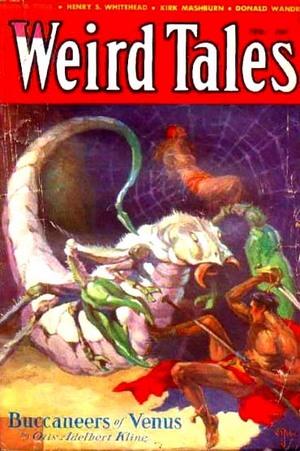 |  |
Instead of the high modernist appropriation of working class speech and culture, Smith's pulp modernism reacquaints modernism with its disavowed pulp doppelganger.
Lovecraft is the crucial figure here since his texts - which first appeared in pulp magazines like Weird Tales - emerged from an occulted trade between pulp horror and modernism. Follow the line back from Lovecraft's short stories and you pass through Dunsany and M R James before coming to Poe. But Poe, also played a decisive role in the development of modernism - via his influence on Baudelaire, Mallarmé, Valéry and their admirer T.S. Eliot. The Waste Land’s debt to Dracula, for instance, is well-known. The fragmentary, citational structure of a story like Lovecraft's ‘Call of Cthulhu’, meanwhile, recalls The Waste Land. More than that: as Benjamin Noys argued in his paper 'Lovecraft the Sinthome' (given at the recent ‘Gothic Remains’ conference at Sussex), the abominations from which Lovecraft’s strait-laced scholars recoil bear comparisons with cubist and futurist art: Lovecraft, that is to say, turns modernism into an object of horror.
Yet Lovecraft's texts are exemplary of Weird, rather than straightforwardly Gothic, fiction. Weird fiction has its own consistency, which can be most clearly delineated by comparing it to two adjacent modes, Fantasy and the Uncanny. Fantasy (and Tolkien is the exemplar here) presupposes a completed World, a world that, although superficially different to 'ours' (there may be different species, or supernatural forces) is politically all-too familiar (there is usually some nostalgia for the ordered organization of feudal hierarchy). The Uncanny, meanwhile, is set in 'our' world - only that world is no longer 'ours' any more, it no longer coincides with itself, it has been estranged. The Weird, however, depends upon the difference between two (or more) worlds - with 'world' here having an ontological sense. It is not a question of an empirical difference - the aliens are not from another planet, they are invaders from another reality system. Hence the defining image is that of the threshold, the door from this world into another, and the key figure is the 'Lurker at the Threshold' - what, in Lovecraft's mythos is called Yog Sothoth. The political philosophical implications are clear: there is no World. What we call the world is a local consensus hallucination, a shared dream.
Is there anybody there?
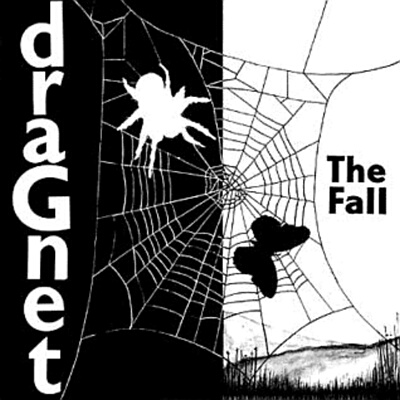
'Part One: of Spectre vs Rector/The Rector lived in Hampshire (the Spectre was from Chorazina)…’
'Spectre vs Rector', from 1979's Dragnet, is the first moment - still chilling to hear - when The Fall both lay out and implement their pulp modernist methodology. ‘Spectre versus Rector’ is not only a ghost story, it is a commentary on the ghost story. The chorus, if it can be called that, is a litany of pulp forebears - 'MR James be born be born/ Yog Sothoth rape me lord...' - in which language devolves into asignifying chant, verbal ectoplasm: 'Sludge Hai Choi/Van Greenway/Ar Corman'.
Not coincidentally, ‘Spectre vs Rector’ was the moment when The Fall really began to sound like themselves. Before that, The Fall’s sound is a grey-complexioned, conspicuously consumptive garage plink-plonk punk, amphetamine-lean and on-edge, marijuana-fatalistic , simultaneously arrogant and unsure of itself, proffering its cheap and nastiness as a challenge. All of the elements of Smith’s later (peripheral) vision are there on Live at the Witch Trials and on the other tracks on Dragnet– watery-eyed figures lurking in the corner of the retina, industrial estates glimpsed through psychotropic stupor - but they have not yet been condensed down, pulped into the witches’ brew that will constitute Smith’s plane of consistency.
On ‘Specter versus Rector’, any vestigial rock presence subsides into hauntology. The original track is nothing of the sort – it is already a palimpsest, spooked by itself; at least two versions are playing, out of sync. The track – and it is very definitely a track, not a ‘song’ - foregrounds both its own textuality and its texturality. It begins with cassette hum and when the sleeve notes tell us that it was partly 'recorded in a damp warehouse in MC/R' we are far from surprised. Steve Hanley’s bass rumbles and thumps like some implacable earth-moving machine invented by a deranged undergound race, not so much rising from subterranea as dragging the sound down into a troglodytic goblin kingdom in which ordinary sonic values are inverted. From now on, and for all the records that really matter, Hanley’s bass will be the lead instrument, the monstrous foundations on which the Fall's upside-down sound will be built. Like Joy Division, fellow modernists from Manchester, The Fall scramble the grammar of white rock by privileging rhythm over melody.
Fellow modernists they might have been, but The Fall and Joy Division's take on modernism could not have been more different. Hannett and Saville gave Joy Division a minimalist, metallic austerity; The Fall's sound and cover art, by contrast, was gnarled, collage cut-up, deliberately incomplete. Both bands were dominated by forbiddingly intense vocalist-visionaries. But where Curtis was the depressive-neurotic, the end of the European Romantic line, Smith was the psychotic, the self-styled destroyer of Romanticism.
‘Unsuitable for Romantics’, Smith will graffiti onto the cover of Hex Enduction Hour, and ‘Specter versus Rector’ is the template for the anti-Romantic methodology he will deploy on The Fall's most important releases. After ‘Spectre Versus Rector’, there is no Mark E Smith the romantic subject. The novelty of Smith's approach is to impose the novel or tale form ('Part 1 of spectre versus rector....') into the Romantic-lyrical tradition of the r and r song, so that the author-function supplants that of the lyrical balladeer. (There are parallels between what Smith does to rock and the cut-up surgery Eliot performed on the etherized patient of Romantic expressive subjectivity in his early poems). Smith chant-narrates, not sings, 'Spectre Vs Rector'.
The story is simple enough, and, on the surface, is deliberately conventional: a post-Exorcist revisiting of the classic English ghost story. (At another level, the narrative is generated by a Roussel-like playing with similar words: Rector/Spectre/Inspector/Excorcist/Exhausted.) A rector is possessed by a malign spirit ('the spectre was from Chorazina' - described on the sleevenotes as 'a negative Jerusalem'); a police inspector tries to intervene but is driven insane. (This a real Lovecraftian touch, since the dread fate that haunts Lovecraft's characters is not of being consumed by the polytendrilled abominations but by the schizophrenia that their appearance often engenders.) Both Rector and Inspector have to be saved by a third figure, a shaman-hero, an Outsider who 'goes back to the mountains' when the exorcism is complete.
The Rector stands for rectitude and rectilinearity as well as for traditional religious authority. (The ontological shock that Lovecraft's monstrosities produce is typically described, any Lovecraft reader will recall, in terms of a twisting of rectilinear geometries.) The Inspector, meanwhile, as Ian Penman conjectured in his 1980 interview with The Fall ‘stands for an investigative, empirical world view’. The hero ('his soul possessed a thousand times') has more affinity with the Spectre, whom he absorbs and becomes ('the spectre possesses the hero/ but the possession is ineffectual') than with the agents of rectitude and or empirical investigation. It seems that the hero is driven more by his addiction to being possessed, which is to say dispossessed of his own identity ('that was his kick from life') than from any altruistic motive. He has no love for the social order he rescues ('I have saved a thousand souls/ they cannot even save their own') but in which he does not occupy a place. ' "Those flowers take them away" he said/ "they're only funeral decorations/ and this is a drudge nation/ a nation of no imagination/ a stupid dead man is their ideal/ they shirk me and think me unclean..... UNCLEAN....."'
In Madness and Civilization, Foucault argues that the insane occupy the structural position vacated by the leper, while in 'The Ecstasy of Communication', Baudrillard describes 'the state of terror proper to the schizophrenic: too great a proximity of everything, the unclean promiscuity of everything which touches, invests and penetrates without resistance, with no halo of private projection to protect him anymore.' Baudrillard is of course describing the schizophrenia of media systems which overwhelm all interiority. Tele-vision brings us voices from far away (and there's always something on the other side...) For Baudrillard, there is an increasing flatness between media and the schizophrenic delirium in which they feature; psychotics often describe themselves as receivers for transmitted signal. And what is the hero of 'Specter versus Rector' if not another version of the ‘ESP medium of discord’ that Smith sings of on ‘Psychic Dancehall’?
Smith's own methodology as writer-ranter-chanter echoes that of the hero-malcontent. He becomes (nothing but) the mystic pad on which stray psychic signals impress themselves, the throat through which a warring multiplicty of mutually antatognistic voices speak. This is not only a matter of the familiar idea that Smith ‘contains multitudes’; the schizophonic riot of voices is itself subject to all kinds of mediation. The voices we hear will often be reported speech, recorded in the compressed 'telegraphic’ headline style Smith borrowed from the Lewis of Blast.
Listening to The Fall now, I'm often reminded of another admirer of Lewis, Marshall McLuhan. The McLuhan of The Mechanical Bride (subtitle: The Folklore of Industrial Man), understood very well the complicity between mass media, modernism and pulp. McLuhan argued that modernist collage was a response to the perfectly schizophrenic layout of the newspaper front page. (And Poe, who in addition to his role as a forebear of Weird fiction, was also the inventor of the Detective genre, plays a crucial role in The Mechanical Bride.)
NEXT - In Part 2: Grotesque Peasants! Psychedelic Communism! Bare Unlife! Ragnorock!
May 03, 2006
Coming attractions...
I haven't been slacking, honest...
Things are very hectic round here, in a good way. The redundancy seems more and more like a blessing, since I really need to be able to devote most of my time to my writing projects. That said, I am going to need some sort of regular income, so I am on the look-out for some part-time teaching in the next academic year, preferably HE. If anyone out there knows of anything suitable in the London area, let me know... I have taught Philosophy, Religious Studies, English Literature, Cultural Studies, Writing and Publishing Studies, Critical Thinking... You can see why they made me redundant, can't you, I'm nowhere near flexible enough...
My two trips to the East Coast over the last couple of weekends have been incredibly inspiring. (One of the - entirely positive - problems I have at the moment is a kind of inspiration glut actually....) The initial fruit of this will be a long post on Weird Suffolk which will be about (amongst other Things) East Anglia's crucial role in the development of weird fiction...
The whole weird fiction line has led me back to The Fall, whom I've been wanting to write about for years, without ever having the angle which would do them justice. So expect a post on The Fall as pulp modernism in the next few days. The long-promised Gothic Nightmares/ Nigel Cooke post is also a few sentences away from completion. As is a post on Ripley and Glam, which will tie together themes from my 'Ethics of Glam' project with ideas from the book on Highsmith that I.T. and I are planning.
Just so this post isn't entirely promissory, I do want to make a few further remarks about subjective destitution. At the Lenin's Tomb/k-punk/Infinite Thought/Savanorola/Messures Taken summit meeting last week, Bat argued that the V for Vendetta version of subjective destitution was closer to the fascist, rather than the leftitst model, because the destitution is something violently imposed upon Evey by what is, in effect, an authority figure. I agree that the film's presentation of subjective destitution is highly problematic, but it is important to stress that the subjective destitution is not something that V does to Evey. Subjective destitution is not equivalent to debasement (even though, as Savanorola pointed out in the same conversation, there has been a strong tendency to 'image' subjective destitution in terms of female debasement). You can be debased without relinquishing your identity, just as you can relinquish your identity without being debased. Evey's subjective destitution happens only when she makes the choice not to identify with what she had previously thought of as herself. The problem - and it arises from the film's central failure to deal with the impersonality of capitalist power - is that there is no need for the agent of ontological change, the analyst/activist who exposes the way in which power constructs reality and identity, also to be a torturer. The agonies of subjective destitution are caused by giving up the comfortable-but-damaging identifications which make you suffer in the first place - in the case of analysis, it might initially seem to the patient that the analyst is attacking them, undermining them, when the aim is to break the connection between the patient and what is making them sick.
There is no need to subject people in capitalism to additional suffering; the point is to get them to recognize that the suffering they are already undergoing is caused by capitalism. Hence my continual harping on about mental illness. The vast numbers of people who suffer some kind of mental illness under capitalism can either think, 'there is some failing with me, if only I could fit into this system better, if only I were working harder, if only I could enjoy these empty pleasures more, then things would be OK' OR 'the problem is with the system that is making me ill...' People already have their heads shaved in psychiatric wards, dope themselves up on multinational-pushed prescription zombile pills, or cut themselves ... the point must be to politicize this, to bring about an ontological reframing...
Owen's comments on dis-identity also raise a number of important issues. There is a sense in which certain types of identity politics are already dis-identifying in what you 'are' - or what you experience yourself as - is no longer a natural given. You re-encounter yourself now as a member of a group embedded in a contingent social antagonism. I would still argue, thought, that the temptation here is to think that there are some actual positive predicates, some agalma, which your ethnos possesses as of right rather than as a structural effect of that antagonism. At the same time, I can perfectly well see that the identitarian move is a step - perhaps an indispensable one in some cases - towards dis-identitying universalism (Malcolm X remains an exemplary case of someone for whom separatism functioned in this way).
